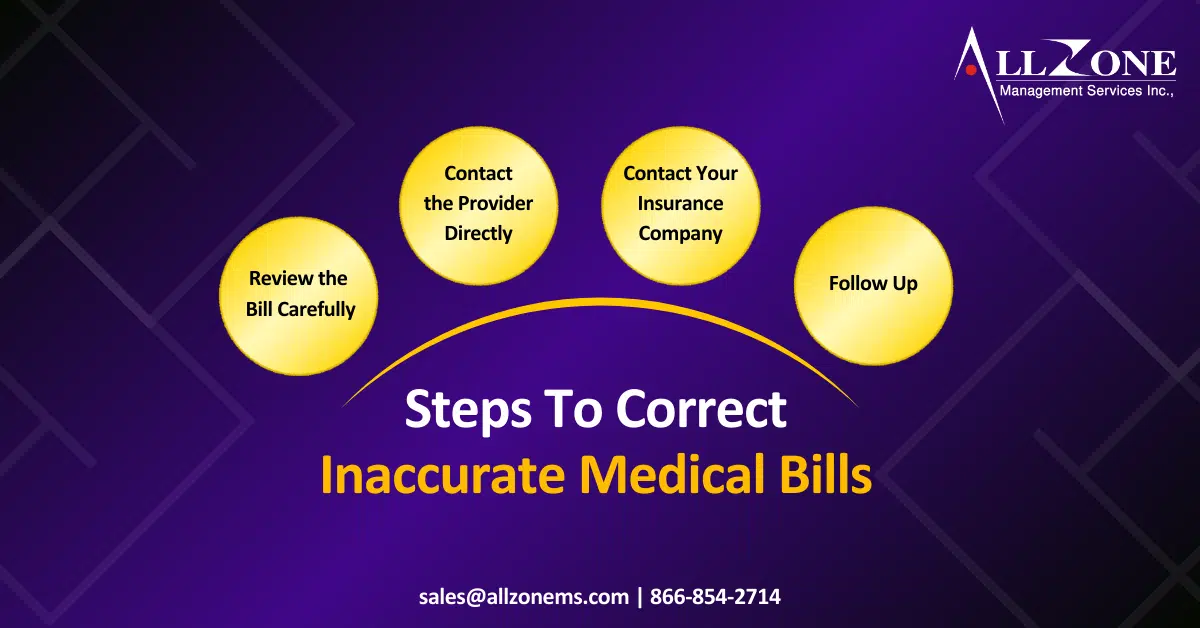Inaccurate medical bills can be a frustrating and costly experience for patients. From coding errors to duplicate charges, these mistakes can lead to financial strain and unnecessary stress. Understanding the common causes of Medical billing errors and taking proactive steps can help you avoid these issues.
Common Causes of Inaccurate Medical Bills
1. Medical Coding Errors: Incorrect or outdated coding can result in underpayment or denial of claims. This often occurs when healthcare providers or their staff uses the wrong codes to describe procedures or diagnoses.
2. Duplicate Charges: Receiving multiple bills for the same service is a common mistake. This can happen due to errors in the billing system or when services are provided by multiple providers.
3. Incorrect Patient Information: Inaccurate patient information, such as insurance details or contact information can lead to delays in processing claims and may result in additional charges.
4. Unbundled Charges: When a single procedure is broken down into multiple charges, it can lead to inflated bills. This practice is often illegal and can result in penalties for healthcare providers.
5. Unnecessary Services: Patients may be billed for services they did not receive or that were not medically necessary. This can occur due to misunderstandings or overtreatment.
Tips for Avoiding Inaccurate Medical Bills
Inaccurate medical bills can be a frustrating and costly experience. Here are some tips to help you avoid these issues:
Before Treatment
- Verify Insurance Coverage: Ensure your insurance plan covers the procedures you need. Ask about any deductibles, copays, or out-of-pocket maximums.
- Request Estimates: Before non-emergency procedures, ask for an estimate of costs, including any potential additional charges.
- Understand Billing Practices: Inquire about the hospital or provider’s billing policies, such as whether they accept you’re insurance directly or if you’ll need to submit claims yourself.
During Treatment
- Check Your Medical Records: Review your medical records to ensure the information is accurate, including your name, address, and insurance information.
- Question Unfamiliar Charges: If you receive a bill with charges you don’t understand, don’t hesitate to ask for clarification.
- Be Informed: Learn about common medical billing terms and codes to better understand your bills.
After Treatment
- Review Bills Carefully: Check your bills for errors, such as incorrect procedures, quantities, or charges.
- Dispute Errors Promptly: If you find an error, contact the provider or insurance company immediately to dispute it.
- Consider a Medical Bill Review Service: If you’re having trouble understanding or disputing your bills, consider hiring a professional medical bill review service.
Steps to Correct Inaccurate Medical Bills
If you’ve received an inaccurate medical bill, here are the steps you can take to correct it:
1. Review the Bill Carefully
- Identify the error: Determine the specific issue, such as incorrect procedures, quantities, or charges.
- Gather supporting documentation: Collect any relevant documents, such as medical records, insurance explanations of benefits, or receipts.
2. Contact the Provider Directly
- Call the billing department: Explain the error and provide supporting evidence.
- Request a corrected bill: Ask for a revised bill that reflects the accurate charges.
- Keep a record of the conversation: Note the date, time, name of the representative, and any agreements made.
3. Contact Your Insurance Company
- Inform your insurer: Notify your insurance company about the disputed charges.
- Provide documentation: Submit copies of the original bill, the corrected bill, and any supporting evidence.
- Request a review: Ask your insurer to review the claim and determine the appropriate coverage.
4. Follow Up
- Track progress: Keep a record of your communications with the provider and insurer.
- Be persistent: If you don’t receive a satisfactory resolution, follow up with both parties.
- Consider mediation: If necessary, explore mediation services to help resolve the dispute.
By following these steps and being persistent, you can increase your chances of successfully correcting inaccurate medical bills and avoiding unnecessary expenses.

